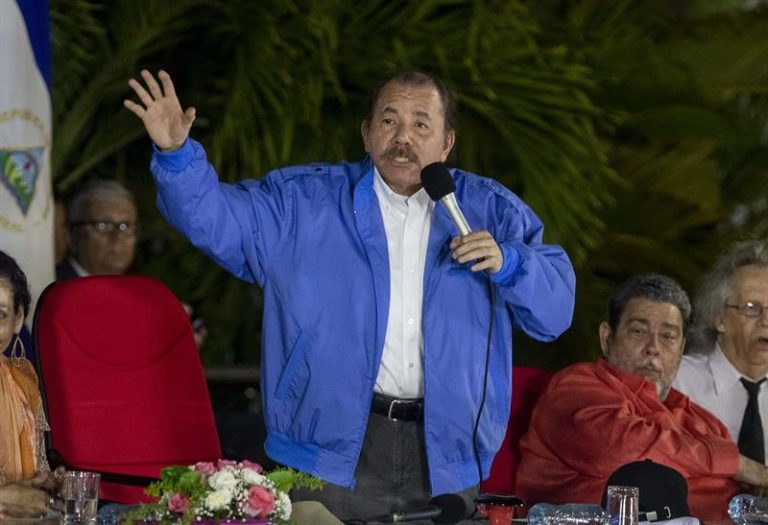27 de mayo 2019

Children of Exile: The Births “Sowing Hope” in the Camp of Nicaraguan Farmers

PUBLICIDAD 1M
PUBLICIDAD 4D
PUBLICIDAD 5D
Civic Alliance withdraws and the regime is alone in the national dialogue, before its refusal to comply with the agreements established.

Daniel Ortega giving a speech. File photo: EFE – Confidencial
After breaching the agreements with the Civic Alliance for Justice and Democracy (ACJD), the Ortega regime promotes a unilateral agenda. The Alliance withdrew from the negotiations, conditioning its return to the definite release of all 232 political prisoners, from a list reconciled with the International Committee of the Red Cross. The dictatorship has only partially freed 99 prisoners, of that list, now under house arrest.
Foreign Minister Denis Moncada Colindres, read a document entitled “Work Program of the Government of Reconciliation and National Unity to Consolidate Stability and Peace in Nicaragua,” which deals superficially with a series of demands of the Civic Alliance, such as the release of political prisoners and respect for constitutional rights.
In the document, the government announced “the definitive freedom not later than June 18, 2019, of the ex-prisoners who are in their homes under house arrest,” However, it does not mention the rest of the 809 detainees in prisons, according to figures of the Inter-American Commission of Human Rights (IACHR), which last March it committed to release.
The government made this announcement last Wednesday, hours before the national strike that took place on Thursday, and a day after the Permanent Council of the Organization of American States (OAS), passed a resolution demanding the release of all the political prisoners, the return of the IACHR and electoral reforms.
No dates are given
Ortega promised, without establishing a date, “to guarantee the right to meeting, demonstration and public mobilization,” which has been prohibited since last September to prevent protests against the regime. However, it warns that these will be allowed under “the law on the matter and the regulations in force,” which the National Police has interpreted at its discretion, since it has not authorized, without valid arguments, the multiple requests made by civic and business organizations.
In the same way, the government reiterated its interest in calling “the international community and international financial organizations, to cease the implementation of sanctions and the threats of new sanctions,” which until now have only affected those close to or relatives of Ortega, although the government maintains that they harm the “people of Nicaragua.”
On freedom of the press, it explained that it will only be allowed after “doing the relevant audits (…) in order to determine the proper use of equipment, supplies and raw materials…,” and the same announced for non-profit organizations, some of which it closed last December through the National Assembly.
The government also said it is willing to carry out electoral reforms only with the OAS, but without agreeing to advance the elections of 2021, as has been recommended and demanded by different local and international groups and organizations.
Extending the agenda
A day after presenting the unilateral agenda, foreign minister Moncada announced an extension of the same, which includes speeding up “peace,” turning the Comprehensive Plan of Attention to Victims (PIAV) into law, forcing demonstrators not to protest and to encourage the return of exiles.
The foreign minister revealed that they will promote “immediately the elaboration of a Draft Law for a Comprehensive Plan of Attention to Victims (PIAV), in order to provide the integral attention and reparation necessary to the victims and their families for damages and losses caused by last year’s attempted coup, based on the principle of forgiveness, not forgetting and not repetition.”
In its extension to the initial points, the government demands the opposition “absolute respect for the Constitution and the laws of the country,” including the recently passed Law for a Culture of Dialogue, Reconciliation, Security, Work and Peace, criticized because, according to experts, deepens Ortega’s control over Nicaraguan society.
The government indicated that its offices in other countries “will provide information and support” to the exiles, who number in the tens of thousands, as part of the plan “Voluntary return of Nicaraguans abroad,” noted by opponents and foreign institutions of not ensuring the security of those who fled.
The announcement of this agenda has further worsened relations between the regime and the Civic Alliance, whose members describe the measure as a “total breakdown” of the negotiations.
Thank you for reading our English section, brought to you in collaboration with Havana Times. If you wish to subscribe to our English Weekly Newsletter, you can do it here. Please spread the word and share this link with your friends, family or contacts.
Regards,
Archivado como:
PUBLICIDAD 3M
Confidencial es un diario digital nicaragüense, de formato multimedia, fundado por Carlos F. Chamorro en junio de 1996. Inició como un semanario impreso y hoy es un medio de referencia regional con información, análisis, entrevistas, perfiles, reportajes e investigaciones sobre Nicaragua, informando desde el exilio por la persecución política de la dictadura de Daniel Ortega y Rosario Murillo.
PUBLICIDAD 3D